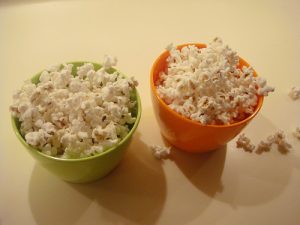Calorie-Light And Loaded With Health Benefits: Popcorn
 If you’re looking for a healthy snack, one that adds few calories to your diet and is nutritious, consider air-popped or stovetop popcorn.
If you’re looking for a healthy snack, one that adds few calories to your diet and is nutritious, consider air-popped or stovetop popcorn.
One cup of air-popped corn without butter contains only 31 calories, and a cup of butter-less stovetop corn – popped in oil – is just 55 calories. Lightly buttered, popped kernels are still low-calorie, with only about 133 per cup.
Popcorn also provides more nutrients than most people realize. It is a whole grain, and like all whole grains it contains several health benefits.
Three Reasons To Snack on Popcorn
- Popcorn contains a surprising amount of antioxidants. Researchers were amazed to discover that popcorn is loaded with more polyphenols, a type of antioxidant, than are found in fruit. Polyphenols help prevent illnesses such as osteoporosis, heart disease, diabetes and neurodegenerative diseases.
- Women require at least 25 grams of dietary fiber daily, and men need at least 38 grams. Most people in the U.S. consume only half of this recommended amount. Snacking on popcorn can help facilitate intestinal regularity, lowering our risk of cardiovascular problems and type 2 diabetes. Four cups of popped corn contains about 4 grams of fiber.
- Popcorn also provides our body with healthy oils such as vitamin E, several B vitamins, protein, iron, calcium, phosphorus and other assorted minerals.
Do-It-Yourself Popcorn Is Best
Microwave popcorn, though convenient and tasty, is typically laced with unhealthy oils and other additives. Plus, it contains many more calories than the popcorn you prepare in a pan or air popper. Caramel or kettle corn is obviously loaded with sugar. Packaged cheddar and other flavored popcorns often contain artificial colors and flavorings, unhealthy fats, and several hard-to-pronounce additives.
It is best to air-pop whole kernel corn or to use a healthy oil to pop it on the stovetop. Olive oil is a good choice, or you might use ghee. Lightly season your popcorn with sea salt and, if you choose, a very small amount of butter.
Sources: SF Gate Healthy Eating, University of Scranton News
 Eating Disorder Self Test. Take the EAT-26 self test to see if you might have eating disorder symptoms that might require professional evaluation. All answers are confidential.
Eating Disorder Self Test. Take the EAT-26 self test to see if you might have eating disorder symptoms that might require professional evaluation. All answers are confidential.